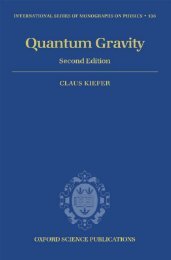- Page 4 and 5: Quantum Field Theory and Gravity Co
- Page 6 and 7: Contents Preface ..................
- Page 8 and 9: Preface The present volume arose fr
- Page 10 and 11: Preface ix 6. (How) can we test qua
- Page 12 and 13: Preface xi Felix Finster, Andreas G
- Page 14 and 15: Preface xiii it is related to other
- Page 18 and 19: Quantum Gravity: Whence, Whither? 3
- Page 20 and 21: Quantum Gravity: Whence, Whither? 5
- Page 22 and 23: Quantum Gravity: Whence, Whither? 7
- Page 24 and 25: Quantum Gravity: Whence, Whither? 9
- Page 26 and 27: Quantum Gravity: Whence, Whither? 1
- Page 28: Quantum Gravity: Whence, Whither? 1
- Page 31 and 32: 16 K. Fredenhagen and K. Rejzner fi
- Page 33 and 34: 18 K. Fredenhagen and K. Rejzner Th
- Page 35 and 36: 20 K. Fredenhagen and K. Rejzner 4.
- Page 37 and 38: 22 K. Fredenhagen and K. Rejzner 5.
- Page 40 and 41: The “Big Wave” Theory for Dark
- Page 42 and 43: The “Big Wave” Theory for Dark
- Page 44 and 45: The “Big Wave” Theory for Dark
- Page 46 and 47: The “Big Wave” Theory for Dark
- Page 48 and 49: The “Big Wave” Theory for Dark
- Page 50 and 51: The “Big Wave” Theory for Dark
- Page 52 and 53: The “Big Wave” Theory for Dark
- Page 54 and 55: The “Big Wave” Theory for Dark
- Page 56 and 57: Discrete and Continuum Third Quanti
- Page 58 and 59: Discrete and Continuum Third Quanti
- Page 60 and 61: Discrete and Continuum Third Quanti
- Page 62 and 63: Discrete and Continuum Third Quanti
- Page 64 and 65: Discrete and Continuum Third Quanti
- Page 66 and 67:
Discrete and Continuum Third Quanti
- Page 68 and 69:
Discrete and Continuum Third Quanti
- Page 70 and 71:
Discrete and Continuum Third Quanti
- Page 72 and 73:
Discrete and Continuum Third Quanti
- Page 74 and 75:
Discrete and Continuum Third Quanti
- Page 76 and 77:
Discrete and Continuum Third Quanti
- Page 78 and 79:
Discrete and Continuum Third Quanti
- Page 80 and 81:
Unsharp Values, Domains and Topoi A
- Page 82 and 83:
Unsharp Values, Domains and Topoi 6
- Page 84 and 85:
Unsharp Values, Domains and Topoi 6
- Page 86 and 87:
Unsharp Values, Domains and Topoi 7
- Page 88 and 89:
Unsharp Values, Domains and Topoi 7
- Page 90 and 91:
Unsharp Values, Domains and Topoi 7
- Page 92 and 93:
Unsharp Values, Domains and Topoi 7
- Page 94 and 95:
Unsharp Values, Domains and Topoi 7
- Page 96 and 97:
Unsharp Values, Domains and Topoi 8
- Page 98 and 99:
Unsharp Values, Domains and Topoi 8
- Page 100 and 101:
Unsharp Values, Domains and Topoi 8
- Page 102 and 103:
Unsharp Values, Domains and Topoi 8
- Page 104 and 105:
Unsharp Values, Domains and Topoi 8
- Page 106 and 107:
Unsharp Values, Domains and Topoi 9
- Page 108 and 109:
Unsharp Values, Domains and Topoi 9
- Page 110 and 111:
Unsharp Values, Domains and Topoi 9
- Page 112 and 113:
Causal Boundary of Spacetimes: Revi
- Page 114 and 115:
Causal Boundaries 99 to the Gromov
- Page 116 and 117:
Causal Boundaries 101 I + (ρ) ρ P
- Page 118 and 119:
Causal Boundaries 103 Figure 2. The
- Page 120 and 121:
Causal Boundaries 105 more pairings
- Page 122 and 123:
Causal Boundaries 107 point of the
- Page 124 and 125:
Causal Boundaries 109 (0, 1) x n x
- Page 126 and 127:
Causal Boundaries 111 to Busemann f
- Page 128 and 129:
Causal Boundaries 113 respectively.
- Page 130 and 131:
Causal Boundaries 115 6.3. Structur
- Page 132 and 133:
Causal Boundaries 117 Qualitative F
- Page 134:
Causal Boundaries 119 [26] E. Mingu
- Page 137 and 138:
122 D. Häfner Let us give an idea
- Page 139 and 140:
124 D. Häfner Figure 1. The collap
- Page 141 and 142:
126 D. Häfner Figure 2. The manifo
- Page 143 and 144:
128 D. Häfner and the angular mome
- Page 145 and 146:
130 D. Häfner Lemma 3.5. There exi
- Page 147 and 148:
132 D. Häfner Proposition 4.4. The
- Page 149 and 150:
134 D. Häfner 6. Strategy of the p
- Page 151 and 152:
136 D. Häfner [3] B. Carter, Black
- Page 153 and 154:
138 R. Oeckl it is less compelling
- Page 155 and 156:
140 R. Oeckl Depending on the theor
- Page 157 and 158:
142 R. Oeckl 2.3. Recovery of stand
- Page 159 and 160:
144 R. Oeckl where the condition A
- Page 161 and 162:
146 R. Oeckl Before we proceed to i
- Page 163 and 164:
148 R. Oeckl the complex classical
- Page 165 and 166:
150 R. Oeckl The corresponding anni
- Page 167 and 168:
152 R. Oeckl Proposition 4.1 (Coher
- Page 169 and 170:
154 R. Oeckl much larger than the s
- Page 171 and 172:
156 R. Oeckl Setting F equal to F
- Page 173 and 174:
158 F. Finster, A. Grotz and D. Sch
- Page 175 and 176:
160 F. Finster, A. Grotz and D. Sch
- Page 177 and 178:
162 F. Finster, A. Grotz and D. Sch
- Page 179 and 180:
164 F. Finster, A. Grotz and D. Sch
- Page 181 and 182:
166 F. Finster, A. Grotz and D. Sch
- Page 183 and 184:
168 F. Finster, A. Grotz and D. Sch
- Page 185 and 186:
170 F. Finster, A. Grotz and D. Sch
- Page 187 and 188:
172 F. Finster, A. Grotz and D. Sch
- Page 189 and 190:
174 F. Finster, A. Grotz and D. Sch
- Page 191 and 192:
176 F. Finster, A. Grotz and D. Sch
- Page 193 and 194:
178 F. Finster, A. Grotz and D. Sch
- Page 195 and 196:
180 F. Finster, A. Grotz and D. Sch
- Page 197 and 198:
182 F. Finster, A. Grotz and D. Sch
- Page 199 and 200:
184 C. Bär and N. Ginoux treat the
- Page 201 and 202:
186 C. Bär and N. Ginoux the categ
- Page 203 and 204:
188 C. Bär and N. Ginoux Example 2
- Page 205 and 206:
190 C. Bär and N. Ginoux 3.2. Diff
- Page 207 and 208:
192 C. Bär and N. Ginoux In other
- Page 209 and 210:
194 C. Bär and N. Ginoux Here (e j
- Page 211 and 212:
196 C. Bär and N. Ginoux Remark 3.
- Page 213 and 214:
198 C. Bär and N. Ginoux Proof. Th
- Page 215 and 216:
200 C. Bär and N. Ginoux To prove
- Page 217 and 218:
202 C. Bär and N. Ginoux We refer
- Page 219 and 220:
204 C. Bär and N. Ginoux where Glo
- Page 221 and 222:
206 C. Bär and N. Ginoux [24] R. M
- Page 223 and 224:
208 C. J. Fewster well-described by
- Page 225 and 226:
210 C. J. Fewster and J + M (p) ∩
- Page 227 and 228:
212 C. J. Fewster commute. As funct
- Page 229 and 230:
214 C. J. Fewster ι + ι − M +
- Page 231 and 232:
216 C. J. Fewster ϕ(ψ) M M ϕ(M)(
- Page 233 and 234:
218 C. J. Fewster theory. The resul
- Page 235 and 236:
220 C. J. Fewster Following [7], a
- Page 237 and 238:
222 C. J. Fewster Sketch of proof.
- Page 239 and 240:
224 C. J. Fewster The relative Cauc
- Page 241 and 242:
226 C. J. Fewster [2] Bär, C., Gin
- Page 244 and 245:
Local Covariance, Renormalization A
- Page 246 and 247:
Local Thermal Equilibrium and Cosmo
- Page 248 and 249:
Local Thermal Equilibrium and Cosmo
- Page 250 and 251:
Local Thermal Equilibrium and Cosmo
- Page 252 and 253:
Local Thermal Equilibrium and Cosmo
- Page 254 and 255:
Local Thermal Equilibrium and Cosmo
- Page 256 and 257:
Local Thermal Equilibrium and Cosmo
- Page 258 and 259:
Local Thermal Equilibrium and Cosmo
- Page 260 and 261:
Local Thermal Equilibrium and Cosmo
- Page 262 and 263:
Local Thermal Equilibrium and Cosmo
- Page 264 and 265:
Local Thermal Equilibrium and Cosmo
- Page 266 and 267:
Local Thermal Equilibrium and Cosmo
- Page 268 and 269:
Local Thermal Equilibrium and Cosmo
- Page 270 and 271:
Local Thermal Equilibrium and Cosmo
- Page 272 and 273:
Shape Dynamics. An Introduction Jul
- Page 274 and 275:
Shape Dynamics. An Introduction 259
- Page 276 and 277:
Shape Dynamics. An Introduction 261
- Page 278 and 279:
Shape Dynamics. An Introduction 263
- Page 280 and 281:
Shape Dynamics. An Introduction 265
- Page 282 and 283:
Shape Dynamics. An Introduction 267
- Page 284 and 285:
where dx bm a Shape Dynamics. An In
- Page 286 and 287:
Shape Dynamics. An Introduction 271
- Page 288 and 289:
Shape Dynamics. An Introduction 273
- Page 290 and 291:
Shape Dynamics. An Introduction 275
- Page 292 and 293:
Shape Dynamics. An Introduction 277
- Page 294 and 295:
Shape Dynamics. An Introduction 279
- Page 296 and 297:
Shape Dynamics. An Introduction 281
- Page 298 and 299:
Shape Dynamics. An Introduction 283
- Page 300 and 301:
Shape Dynamics. An Introduction 285
- Page 302 and 303:
Shape Dynamics. An Introduction 287
- Page 304 and 305:
Shape Dynamics. An Introduction 289
- Page 306 and 307:
Shape Dynamics. An Introduction 291
- Page 308 and 309:
Shape Dynamics. An Introduction 293
- Page 310 and 311:
Shape Dynamics. An Introduction 295
- Page 312:
Shape Dynamics. An Introduction 297
- Page 315 and 316:
300 M. Kiessling In the following,
- Page 317 and 318:
302 M. Kiessling where “δ( · )
- Page 319 and 320:
304 M. Kiessling the point charge,
- Page 321 and 322:
306 M. Kiessling (2.17) and (2.18)
- Page 323 and 324:
308 M. Kiessling Maxwell’s “law
- Page 325 and 326:
310 M. Kiessling argued that E f (
- Page 327 and 328:
312 M. Kiessling the Maxwell-Born-I
- Page 329 and 330:
314 M. Kiessling removal. For insta
- Page 331 and 332:
316 M. Kiessling ∂ 4πc that for
- Page 333 and 334:
318 M. Kiessling d dt Dirac, on the
- Page 335 and 336:
320 M. Kiessling The Lorenz-Lorentz
- Page 337 and 338:
322 M. Kiessling ( 1 c Lorentz and
- Page 339 and 340:
324 M. Kiessling potential fields
- Page 341 and 342:
326 M. Kiessling as I have done her
- Page 343 and 344:
328 M. Kiessling just the Hamilton-
- Page 345 and 346:
330 M. Kiessling 7. Closing remarks
- Page 347 and 348:
332 M. Kiessling [Bor1937] Born, M.
- Page 349 and 350:
334 M. Kiessling [Lié1898] Liénar
- Page 352 and 353:
How Unique Are Higher-dimensional B
- Page 354 and 355:
How Unique Are Higher-dimensional B
- Page 356 and 357:
How Unique Are Higher-dimensional B
- Page 358 and 359:
How Unique Are Higher-dimensional B
- Page 360 and 361:
Equivalence Principle, Quantum Mech
- Page 362 and 363:
Atom Interferometry 347 The second
- Page 364 and 365:
Atom Interferometry 349 α CR , aim
- Page 366 and 367:
Atom Interferometry 351 of this mas
- Page 368 and 369:
Atom Interferometry 353 height B A
- Page 370 and 371:
Atom Interferometry 355 iff ψ = (
- Page 372 and 373:
Atom Interferometry 357 have be rea
- Page 374 and 375:
Atom Interferometry 359 where F (t
- Page 376 and 377:
Atom Interferometry 361 5.2. Interf
- Page 378 and 379:
Atom Interferometry 363 Evaluating
- Page 380 and 381:
Atom Interferometry 365 where the l
- Page 382 and 383:
Atom Interferometry 367 Then they s
- Page 384 and 385:
Atom Interferometry 369 [8] T.M. Fo
- Page 386 and 387:
Index n-point function, 51, 146, 23
- Page 388 and 389:
Index 373 conformal field theory, 1
- Page 390 and 391:
Index 375 gravitational redshift, 2
- Page 392 and 393:
Index 377 operator product, 138 par
- Page 394 and 395:
Index 379 standard model of particl


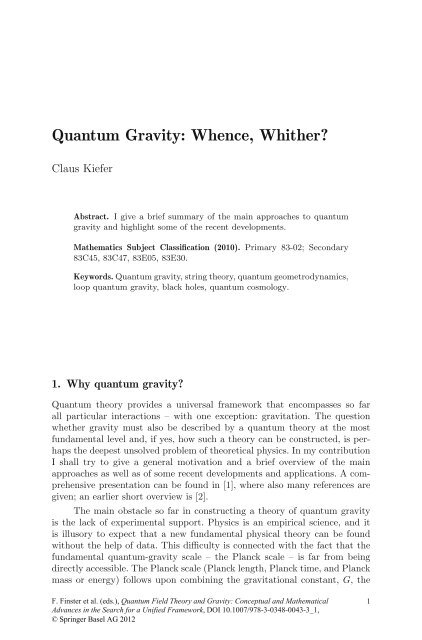
![arXiv:1001.0993v1 [hep-ph] 6 Jan 2010](https://img.yumpu.com/51282177/1/190x245/arxiv10010993v1-hep-ph-6-jan-2010.jpg?quality=85)

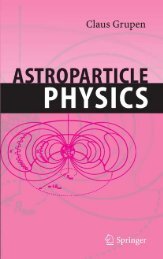
![arXiv:1008.3907v2 [astro-ph.CO] 1 Nov 2011](https://img.yumpu.com/48909562/1/190x245/arxiv10083907v2-astro-phco-1-nov-2011.jpg?quality=85)

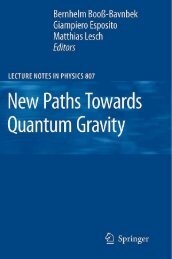
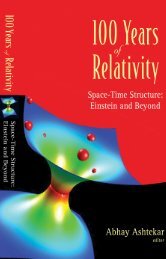


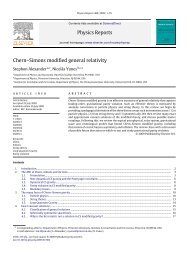
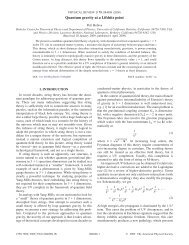
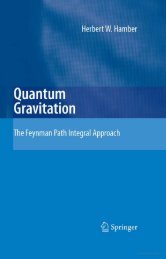
![arXiv:1002.4928v1 [gr-qc] 26 Feb 2010](https://img.yumpu.com/41209516/1/190x245/arxiv10024928v1-gr-qc-26-feb-2010.jpg?quality=85)
![arXiv:1206.2653v1 [astro-ph.CO] 12 Jun 2012](https://img.yumpu.com/39510078/1/190x245/arxiv12062653v1-astro-phco-12-jun-2012.jpg?quality=85)
